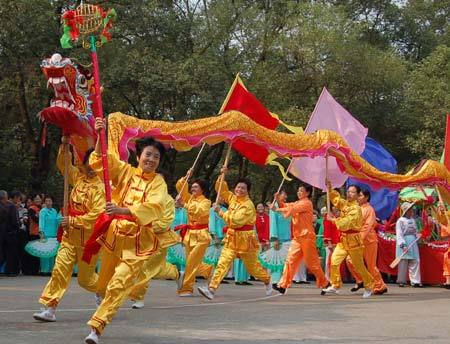IX-4 Question: The problem of “getting old before getting rich” is a challenge for the Chinese economy. What are the characteristics of China's aging society? What measures will it take to guarantee the legal rights and interests of the elderly and balance social service undertakings for senior citizens and economic development?
A: According to international standards, China has been an aging society since 1999. At present, China has 143 million people above the age of 60, accounting for 11 percent of its total population. By 2010, the number will rise to 174 million, 12.78 percent of the total population. Under this estimation, China's aging problem will peak in 2030.
Population aging is a global issue. However, it is more acutely felt in China, with prominent characteristics as follows:
First, China has the largest number of elders, which accounts for one-fifth of the world's total elderly population. By 2050, its elderly population will exceed 400 million.
Second, life expectancy in China has been greatly extended, leading to an obvious aging tendency.
Third, when China became an aging society, its per-capita GDP was under US$1,000, while the figure for developed countries during the same stage is generally between US$5,000-10,000. When the economy is underdeveloped, aging can bring many problems, including tremendous changes and challenges to the consumption structure, total labor force and social security.
Fourth, the number of elderly people living without spouses or children is quickly increasing and will further grow amid the development of urbanization and changing of lifestyle.
Fifth, there is insufficient living support for elderly rural residents. With the acceleration of urbanization, young farmers are flooding into cities, which will further speed the aging of rural population and weaken the ability of rural families to provide support for their senior members.
In order to actively respond to the aging issue, the Chinese Government will continue to increase financial appropriation to the building of a social safety net, diversify funding channels of social security for the elderly, determine the reasonable standards of public benefits and provision approaches, and promote the construction of infrastructure for an easier life for the elderly. It will also encourage the building and improvement of a service network for senior citizens combining family support and social support. To be in place consequently will be a social security system for the elderly that is broad in coverage, sustainable in development, suitable for national economic and social conditions and compatible with other social security schemes.
At the same time, the Chinese Government will include the elderly service industries in the overall plan for national economic development and put them on the list for state priority support. It will adopt favorable policies, such as tax breaks, administrative fee cuts and exemption and credit support, to help the growth of the country's nascent elderly service sector. It will encourage and guide non-public capital, such as privately owned and foreign-funded businesses, to participate in the development of the elderly service industries, attract social investment into establishment of various nursing homes for elders and encourage the production of various kinds of products to meet different demands of the elderly people.
The elderly population in China is growing at an annual average rate of 3 percent. In face of the escalating challenge of an aging population, the Chinese Government will take more effective measures to promote the balanced development of the elderly service undertakings and national economy and social life, in order to enable senior citizens to enjoy the benefits brought about by economic and social progress.

(China.org.cn)